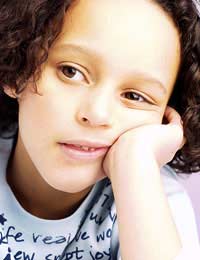Childhood Distress

Depression isn't just experienced by adults. In fact it also affects many children each year and impacts the entire family. The symptoms of depression are often quite different from those experienced by adults and there is a greater onus on parents and educators to recognise depression symptoms in children.
Why Do Children Get Depressed?
There is no one answer for why kids get depressed. Stressful events such as moving house, death of a pet or family member and divorce can all trigger depression in a child. Other experiences that may contribute to childhood depression are:- Change to a new school
- Someone in the home suffering from long-term illness
- Bullying at school
Recognising Depression in a Child
As with adults, a diagnosis of depression is usually dependent on depression symptoms being present for two or more weeks. Some of the symptoms a child may experience are:- Feeling down or 'blue'
- Tiredness and low energy
- Not wanting to play with friends
- Feeling angry, anxious or annoyed
- Change in eating habits leading to weight gain or loss
- Trouble focusing
- Non-specific aches and pains
- Headaches
- No longer having fun and enjoying usual activities
Treatment for Children
The first examination will likely be with the child's primary care doctor, who will want to conduct a physical evaluation to ensure that it is not another illness that is causing depression symptoms. A referral to a psychiatrist or psychologist is also possible. Treatment may involve antidepressant therapy alongside counselling and other behavioural therapies. Family counselling may be required to address any familial issues that are affecting the child. Depending on the child's age, he or she may be able to contribute to the formulation of a depression management plan and this active role can be helpful during treatment.A child's teachers should usually be informed of the depression and should know about any medications or other treatments that may be relevant to the child during school hours. It can also help for teachers to be aware of side effects from depression medications, so they can provide any assistance if side effects are uncomfortable for the child.
What Can Parents Do To Help?
As a parent, it's difficult to see your child unhappy and suffering. Parents often feel they are fully responsible for keeping their child happy and they may suffer from guilt when their child is diagnosed with depression. It's important for parents to obtain counselling as well as it can help deal with any guilt and frustration stemming from feelings around their child's depression. Some of the other things a parent can do are:- Encourage your child to participate in activities with friends and family members.
- Monitor all medications and ensure that your child takes prescriptions on time.
- Gently coax your child to eat a wide range of healthy foods.
- Be open and supportive and let your child know that you are there to listen if he or she wants to talk, even if the talking involves painful feelings and worries.
- Watch carefully for warning signs of suicide, which may include talking about death or your child giving his or her possessions away.
Related Articles in the 'Types of Depression' Category...
- Depression and Sexual Assault
- Eating Disorders and Depression
- Soldiers and Post Traumatic Stress Disorder
- Pets and Depression
- Depression and Bullying
- Melatonin and Seasonal Affective Disorder
- Major Depression
- Depression Due to Bereavement
- Seasonal Affective Disorder
- Bipolar and Manic Depression
- Dysthymia Depression
- Postnatal Depression (PND)
- PMS and Depression
- Depression in Young Men


Re: Depression Due to Bereavement
My mam died 9 months ago every day since is as raw as the day I lost her I have 2 son's and grandchildren and a marvelous…
Re: How to Rebuild Your Life After a Breakdown
a few years ago I had a mental breakdown resulting in the loss of an entire church, and as a result, all of my…
Re: How to Rebuild Your Life After a Breakdown
In this state of dipression.we hate ourself which is ridiculous but we become dipressed when we don't have…
Re: How to Rebuild Your Life After a Breakdown
Brother and sisters I also had great dippression due to my own behaviour and faults but now I feel like after…
Re: How to Reduce the Risks of Depression Reoccurring
I haven’t been diagnosed bipolar but can identify with the above.
Re: How to Rebuild Your Life After a Breakdown
Hi, I just came across this post as I was doing research for my blog. It was cool that I found it because I just…
Re: How to Rebuild Your Life After a Breakdown
I would like help please I am very depressed
Re: How to Rebuild Your Life After a Breakdown
I had a nervous breakdown in august and took to my bed for 3 months. I now blame myself for the mess my life is…
Re: Depression Due to Bereavement
I just lost my husband hollween morning heart attack in main bedroom and died I was his career ,wife,nurse,over 20years together…
Re: How to Rebuild Your Life After a Breakdown
I'm 32 and have had severe depression, insomnia, HF autism and adhd my entire life. I had some help as a…